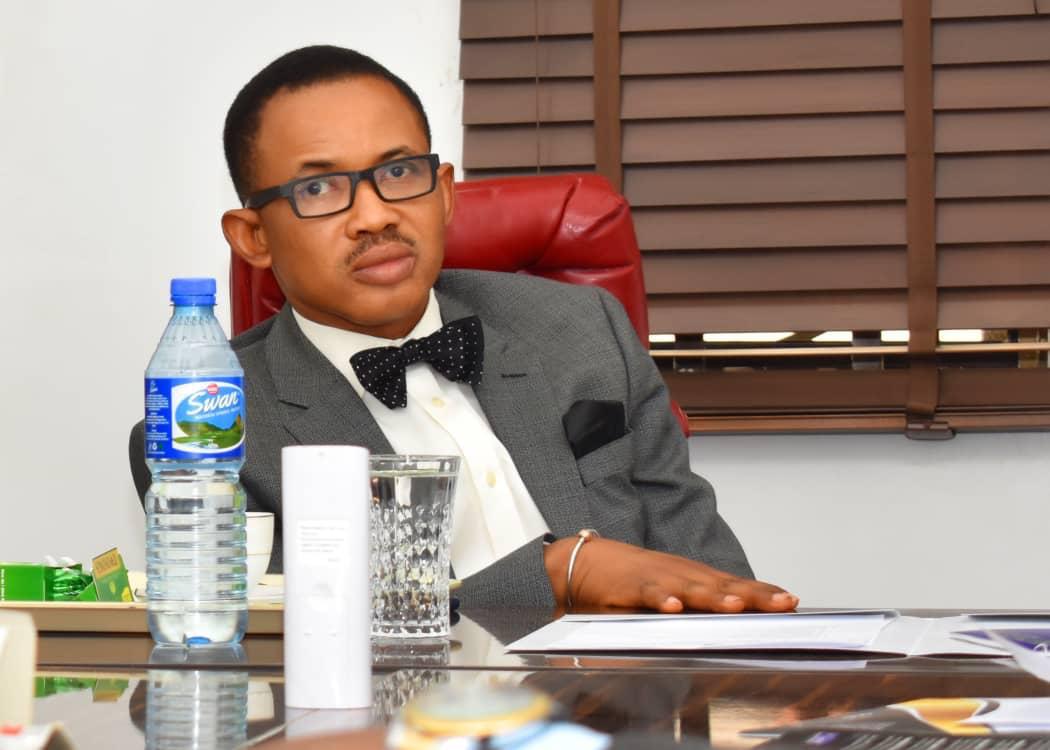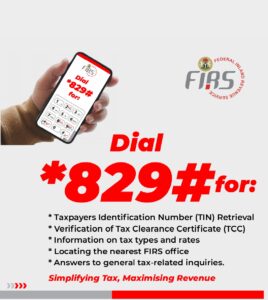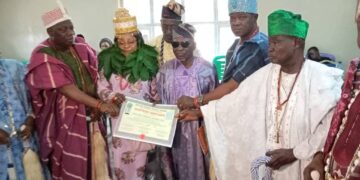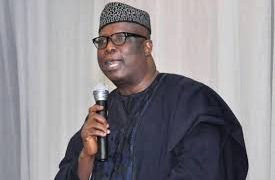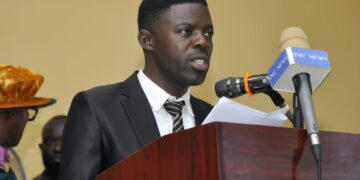KAYODE AJULO & Co. CASTLE OF LAW
BARRISTERS / SOLICITORS/ CONSULTANTS/ ARBITRATORS/ NOTARIES
BN 2028223
LEGAL OPINION ON THE LEGALITY OR OTHERWISE OF SECTION 84(12) OF THE ELECTORAL ACT, 2022
SUBMITTED TO:
H. E. Senator Dr. Ahmed Lawan,
The Senate President,
National Assembly of the Federal Republic of Nigeria.
COPIED:
1. The President of the Federal Republic of Nigeria;
2. The Honorable Speaker, Federal House of Representatives;
3. The Honorable Attorney General of the Federation.
*LEGAL OPINION ON THE LEGALITY OR OTHERWISE OF SECTION 84(12) OF THE ELECTORAL ACT, 2022*
1.0 INTRODUCTION
1.1 It is no more news that President Muhammadu Buhari on Friday, 25th February, 2022 signed the Electoral Act, 2022 into law.-1-
It suffices to recall that the said Bill was signed into law after it has suffered protracted delay and setbacks both from the Presidency and the National Assembly, particularly on the provision of the Bill which relates to mandatory direct primaries.-2-
1.2 It is pertinent to recall that during the ceremony, Mr. President voiced his reservation with respect of the provision of Section 84(12) of the new Law. According to the statement credited to Mr. President, he noted that the said provision is in conflict with extant constitutional provisions.-3-
1.3 He further noted that Section 84(12) constitutes a disenfranchisement of serving political office holders from voting or being voted for at Conventions or Congresses of any political party for the purpose of the nomination of candidates for any election in case where it holds earlier that 30 days to the National Election.
1.4 The above reservations credited to the President has forthwith generated reactions, reprimands and diatribe from political pundits, lackeys and constitutional legal minds.-4-
1.5 It is on the above premises that it is imperative to pensively consider the provisions of Section 84(12) of the new Electoral Act viz-a-viz relevant provisions of the Constitution and other enabling statutes and regulations in the bid to ascertain the legality or otherwise of the provision of the Act.
1.6 In providing this Legal Opinion we have consulted the following relevant Laws and Regulations;
A. THE CONSTITUTION OF THE FEDERAL REPUBLIC OF NIGERIA, 1999 (AS AMENDED);
B. THE ELECTORAL ACT, 2022;
C. THE PUBLIC SERVICE RULES;
D. THE CONSTITUTION OF THE ALL PROGRESSIVES CONGRESS;
E. THE CONSTITUTION OF THE PEOPLES DEMOCRATIC PARTY,
F. THE CONSTITUTION OF LABOUR PARTY;
G. VARIOUS JUDICIAL DECISIONS.
H. FOREIGN STATUTORY PROVISIONS
2.0FACTUAL MATRIX
2.1 On the 25th of February, 2022, President Muhammadu Buhari GCFR signed the Electoral Act, Amendment Bill into law. It suffices to recall that the said Bill was signed into law after it has suffered protracted delay and setbacks both from the Presidency and the National Assembly, particularly on the provision of the Bill which relates to mandatory direct primaries.
2.2 During the signing of the Electoral Bill into Law by President Muhammadu Buhari GCFR on the 25th of February, 2022, Mr. President voiced his reservation with respect of the provision of Section 84(12) of the new Law. According to the statement credited to Mr. President, he noted that the said provision is in conflict with extant constitutional provisions.
2.3 Recently, President Muhammadu Buhari has transmitted his reservation to the National Assembly while seeking the amendment of that Section of the fledging Electoral Act.-5-
2.4This comprehensive legal opinion therefore seeks to ascertain the Constitutionality or otherwise of the provision of Section 84(12) of the Electoral Act.
3.0LEGAL OPINION
3.1 In stating this Legal Opinion, we shall be considering the following issues:
a. Whether the provision of Section 84(12) is in contravention with the provisions of the Constitution of the Federal Republic of Nigeria, 1999 (as amended).
b. Whether a political appointee is a public servant under the provisions of the Constitution.
c. Whether Section 84(12) of the Electoral Act, 2022 disenfranchises political office holders as guaranteed under the provision of Section 40 of the Constitution of the Federal Republic of Nigeria, 1999 (as amended)
On the Commendable provision of Section 84(12) of Electoral Act, 2022.
A. Whether the provision of Section 84(12) is in contravention with the provisions of the Constitution of the Federal Republic of Nigeria, 1999 (as amended).
3.2 Firstly it must be stated that the Constitution is the ground norm and any other law which is inconsistent with the provision of the Constitution shall be null and void to the extent of its inconsistency. Section 1(3) of the Constitution of the Federal Republic of Nigeria, 1999 (as amended) provides as follows:
If any other law is inconsistent with the provisions of this Constitution, this Constitution shall prevail, and that other law shall to the extent of the inconsistency be void.
3.3 In INEC vs. Musa (2003)3 NWLR (Pt. 806) 72 at 157 Paras. D-G, his Lordship Ayoola, J.S.C. as he then was held amongst others that:…
“First, all powers, legislative, executive and judicial must ultimately be traced to the constitution. Secondly, the legislative powers of the legislature cannot be exercised inconsistently with the constitution. Where it is so exercised it is invalid to the extent of such inconsistency. Thirdly, where the constitution has enacted exhaustively in respect of any situation, conduct or subject, a body that claims to legislate in addition to what the constitution had enacted must show that it has derived the legislative authority to do so from the constitution. Fourthly, where the constitution sets the condition for doing a thing, no legislation of the National Assembly or of a state House of Assembly can alter those constitution in any way, directly or indirectly, unless, of course the constitution itself as an attribute of its supremacy expressly so authorized…”
3.4 It must be noted that the provision of Section 84(12) of the Electoral Act derives its validity from the Constitution and same does not contravene the provision of the Constitution. By the provision of Section 228 of the Constitution of the Federal Republic of Nigeria, 1999 (as amended) the National Assembly has the power to provide guidelines and rules to ensure internal democracy within political parties, including making laws for the conduct of the party primaries, party congresses and party convention.
3.5 For the avoidance of doubt, Section 228 of the Constitution of the Federal Republic of Nigeria, 1999 (as amended) provides as follows:
The National Assembly may by law provide:
(a)Guidelines and rules to ensure internal democracy within political parties, including making laws for the conduct of the party primaries, party congresses and party convention and
(b)The conferment on the Independent National Electoral Commission of powers as may appear to the National Assembly to be necessary or desirable for the purpose of enabling the Commission more effectively to ensure that political parties observe the practices of internal democracy, including the fair and transparent conduct of party primaries, part congresses and party conventions….
3.6 Having established the Constitutional powers of the National Assembly-6- to make laws for the regulation of internal democracy of political parties, it is apt to consider the interpretation of the Section 84(12) of the Electoral Act, 2022 which provides that:
“No political appointee at any level shall be voting delegates-7- or be voted for at the Convention or Congress of any political party for the purpose of the nomination of candidates for any election”.
3.7 A literal interpretation-8- of the above provision is that an appointee of the Executive should not, and must not, be a delegate-9- in primary elections while still in office, just as an appointee must not be contesting while still in office at the Convention-9- or Congress of any political party.
3.8 Suffices to also note that varying provisions of the Constitution provide for the disqualification of persons from vying for the post of the senate or House of Representatives if he is a person employed in the public service of the federation or of any State and has not resigned, withdrawn or retired from such employment, thirty days before the date of election.-11-
3.9 It is also instructive to note that a public servant is also disqualified from contesting the position of President, Vice President, Governor and Deputy Governor respectively if same has not resigned from that position within a period of 30 days before the date of election.-12-
B. Whether a Political Appointee is a public servant under the provisions of the Constitution.
3.10 By virtue of Section 318(1) of the 1999 Constitution, public service of the Federation means the service of the federation in any capacity in respect of the Government of the Federation and includes:
a. Clerk of other staff of the National Assembly or of each House of the National Assembly;
b. Member of staff of the Supreme Court, the Court of Appeal, the Federal High Court, the High Court of the Federal Capital Territory, Abuja, the Sharia Court of Appeal of the Federal Capital Territory, Abuja, the Customary Court of Appeal of the Federal Capital Territory, Abuja or other courts established for the Federation by this Constitution and by an Act of the National Assembly;
c. Memberofstaffofanycommissionorauthorityestablished for the Federation by this Constitution or by an Act of the National Assembly;
d. Staff of any area Council
e. Staff of any statutory Corporation established by an Act of the National Assembly;
f. Staff of any educational institution established or financed principally by the Government of the Federation;
g. Staff of any company or enterprise in which the Government of the Federation or its agency owns controlling shares or interest; and
h. Members or officers of the armed forces of the Federation or the Nigeria Police Force or other government security agencies established by law;
The Section also makes similar provisions for public service of the State.
3.11 One can argue that the reason for the requirement of resignation of a public servant before election is to ensure neutrality of persons in the Executive Administration of the Government at all levels and to prevent partisan politics in the civil service. Notably the Public Service Rules prohibits a Civil Servant from being involved in partisan politics. So if you want to be involved in partisan politics, you must resign-13-
3.12 Section 4 article 030402(g) of the Public Service Rules categorically states that “Engaging in partisan political activities” is one of the significant examples of serious misconduct.-14- See also the decision of the Supreme Court in the case of Independent National Electoral Commission v Musa & Ors. (2003) (supra).
3.13 It is quite succinct to state that by the dint of the provisions of Section 318(1) of the Constitution of the Federal Republic of Nigeria as highlighted above, a political office holder is not a public servant or in the public service. See the case of OJONYE V. ONU & ORS(2018) LPELR-44223(CA) where the Court held that political appointees hold office at the pleasure of the Chief Executive and they are not public servants as provided for under the Constitution.
3.14 See also the decision of the Court in the case of ITUEN V. IKOT EKPENE LOCAL GOVT COUNCIL (2017) LPELR-43646(CA) where the Court held as follows:
“A political office holder is any office holder who is not a public officer or a person employed by the civil service judicial service of the State but who is appointed by a politician and who holds office at the pleasure of the person appointing him”
3.15 It is apposite to note that the position of the law is that the express mention of one thing in a statutory provision or schedule, excludes the other. See UDOH V OMHB (1993) 7 SCNJ (Pt. 2) 436, 444.
3.16 The Supreme Court in the case of the ATTORNEY GENERAL OF BENDEL STATE & 2 ORS. VS. ADEYAN (1989) 9 SC 127 stated as follows:
“It is now firmly established that in the construction of a statutory provision where a statute mentions specific things or persons the intention is that those not mentioned are not intended to be included.”
3.17 Since the Constitution expressly states that a public servant must resign within a period of 30 days before the conduct of the election, the said section does not include political appointees. Hence, political appointees cannot take coverage under these provisions of the Constitution.
C. Whether Section 84(12) of the Electoral Act, 2022 disenfranchises political office holders as guaranteed under the provision of Section 40 of the Constitution of the Federal Republic of Nigeria, 1999 (as amended)
3.18 It must be stated pronto and very clearly too that the right to assemble freely and associate with other persons as provided in Section 40 and the right to form a political party as provided for under Section 221 of the Constitution has not been derogated from by the provision of Section 84(12) of the Electoral Act.
3.19 The said provision has not preclude political appointees from becoming a member of a political party or to vote at general elections. It only precludes them from voting as a delegate at the party’s convention and congresses. This regulation only deals with the internal affairs of political parties. Moreso, a political appointee does not hold the office as of right but at the pleasure of the Chief Executive.-15-
D. On the Commendable provision of Section 84(12) of the Electoral Act, 2022.
3.20Having established the legality of the provision of Section 84(12) of the Electoral Act, 2022, it is pertinent to state that most of these political appointees have ended up using their offices to intimidate political opponents of their principals during party primaries in a bid to retain their jobs.-16-
3.21Moreso, the Section of the Act was designed to create a level playing ground for all aspirants during congresses and conventions. It is instructive to note that the Section does not in any way undermine the rights of political appointees to hold office or participate in primaries or main elections.
4.0 CONCLUSION
4.1 On the backdrop of the above provisions of statutory and judicial authorities, it is safe to conclude that the provision of Section 84(12) of the Electoral Act is valid and same is not ultra vires the provisions of the Constitution of the Federal Republic of Nigeria.
4.2 There is no provision of the Constitution which guarantees continued exercise of political appointment of these appointees. It is a privilege and same can be regulated by an Act of the National Assembly as rightly done under the new Electoral Act.
4.3 Moreso, it is opined that rather than subjecting the fledging Act to another rigorous and herculean Amendment, the Court of Law should be resorted to by any aggrieved party for the interpretation of the constitutionality or otherwise of the provision of Section 84(12) of the Electoral Act.
Dated this 2nd day of March, 2022
________________________ DR. KAYODE AJULO, FCIArb.UK
ZAK BABAH, ESQ.
PROF O. B AKINOLA, ESQ. OLUDOTUN SOWEMIMO ESQ.
BAMIKOLE ADULOJU, ESQ.
OLUWOLE ADAJA, ESQ. AKINOLA OLADIMEJI, ESQ. IFUNANYA OKEKE, ESQ.
ROSELINE AKINSANMI, ESQ. AISHA BALA MUHAMMED, ESQ.
TAUYYIB KAYODE SHITTU, ESQ.
OLALEKAN BOSEDE, ESQ. OLADIPUPO IGE, ESQ.
ENIOLA OYELAMI, ESQ.
EKUM OGBE, ESQ.
KAYODE AJULO & CO. CASTLE OF LAW 21, Amazon Street, Ministers Hill, Maitama District,
Abuja, Nigeria. +234(0)8033154349
chambers@castleoflaw.com
Foot Note:
1
<Dailypost.ng/2022/02/25/buhari-signs-electoral-amendment-bill-into-law> accessed on the 25th February, 2022
2
<Vanguardngr.com/20221/12/electoral-bill-buhari-rejects-bill-says-imposing-direct-primaries-on-political-parties- will-cause-trouble-in-polity> accessed on the 25th February, 2022
3
Thecable.ng/full-text-buharis-speech-at-signing-of-electoral-act-amendment-bill accessed on 25th February, 2022
4 <Pulse.ng/news/local/Nigerians-react-as-buhari-signs-the-electoral-act-amendment-bill/21gpxse> accessed on the 25th February, 2022
5 <https://www.google.com/amp/s/www.channelstv.com/2022/03/01/just-in-buhari-writes-senate-seeks- amendment-of-section-84-12-in-electoral-act/amp/ accessed on the 1st Match, 2022; punchng.com/electoral-act- buhari-writes-nassembly-demands-voting-rights-for-political-appointees/ accessed on the 1st March, 2022
6
The legislative powers of the Federal Republic of Nigeria is vested in the National Assembly which consist of a Senate and a House of Representatives. See Section 4 of the Constitution of the Federal Republic of Nigeria, 1999 (as amended).
7
Voting delegate means a Delegate who is authorized to vote on behalf of a member Board https://www.lawinsider.com/voting-delegate accessed on 1st March, 2022.
8
ATTORNEY GENERAL OF BENDEL STATE v. ATTORNEY-GENERAL OF THE FEDERATION (1981) 1 F.N.L.R. 179, (1982) 3 NCLR 1 wherein Obaseki, JSC laid down 12 guidelines to be observed in interpretation of statutes as follows:
1. Effect should be given to every word used in the Constitution.
2. A construction nullifying a specific clause in the Constitution shall not be tolerated, unless where absolutely
necessary.
3. A constitutional power should not be used to attain an unconstitutional result.
4. The language of the Constitution, where clear and unambiguous must be given its plain and evident
meaning…
9
The Constitution of the various Political Parties in Nigeria provides for the mode of electing delegates both from the Ward Level to the State Level.
10
A deliberative assembly that consists of delegates elected or appointed from subordinate or constituent organizations within a state or national organization, or elected directly from the organization’s membership or from defined geographic or other constituencies into which the membership is grouped, and that usu. exercises the organization’s highest policymaking authority <a national political convention>. See Blacks Law Dictionary 8th Edn. See also Article 21.1 of the All Progressives Congress Constitution and Article 33 of the Peoples Democratic Party’s Constitution.
11
See Section 66(1),(f) of the Constitution of the Federal Republic of Nigeria, 1999 (as amended). See also Section 107(1), (f) of the Constitution with respect to disqualification of a public servant from vying for the position of member of House of Assembly.
12
See Section 137(1)(g), 182(1)(g) of the Constitution of the Federal Republic of Nigeria, 1999 (as amended).
13
See Article 31 of the Constitution of the All Progressives Congress which provides that any party office holder interested in contesting for an elective office (whether party office or office in a general election) shall resign and leave office 30 days prior to the date of nomination or party primary for the office he or she is seeking to contest.
14
Similarly, the Hatch Act, 5 U.S.C SS 7321-7326 restricts Federal employee involvement in partisan political activity. Partisan political activity is any activity directed toward the success or failure of a partisan candidate, political party, or partisan political group. Violation of the Hatch Act may result in disciplinary action, to include removal from Federal employment. <doi.gov/ethics/political-activity/ accessed on the 1st March, 2022.
15
The Political Appointees are technocrats who are appointed based on their expertise. Hence, they should not
use the platform of their appointment to scuttle internal democracy.
16
See Ojo, O.E (2019) Party primaries and candidate selection in Nigeria 1999-2009 POLAC Historical Review (a journal of the department of History and International Studies), Nigeria Police Academy where the Author opined that: “It is of great significance to note that perhaps the greatest advantage which President Olusegun Obasanjo had was the power of incumbency which he and his campaign strategists explored to the fullest. For instance some of the other aspirants had cause to complain about the number of the President’s aides who would go to the convention as delegates. There were initially 3,067 delegates slated for the convention. But John Ogbeide, Obasanjo’s campaign coordinator in Edo State, disclosed that the inclusion of more Commissioners and Special Advisers from each state slot the number up to 4,000 of this number, the President was sure of the support of nearly 1,000 of them, ever before the primaries took place, these were made up of ministers and other government officials in the ruling party who would naturally vote for the man whose government they work for”.
*CastleofLaw*



